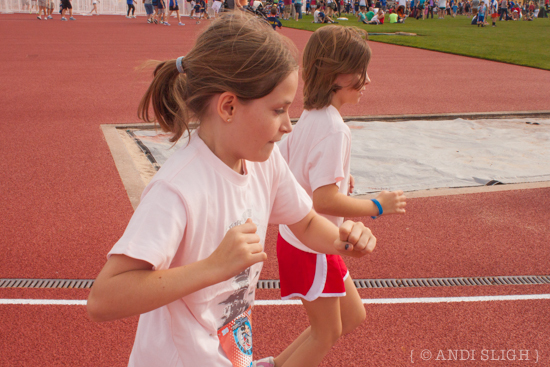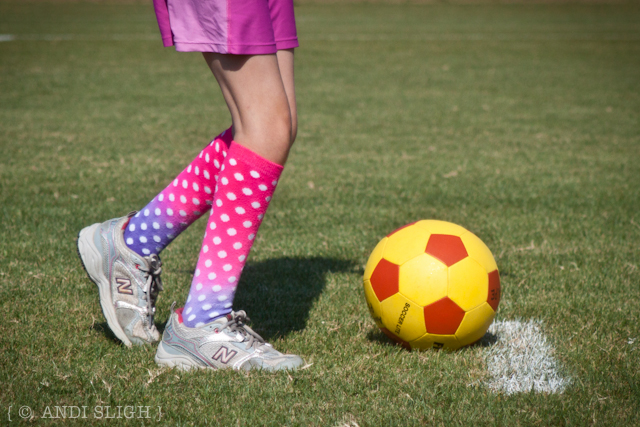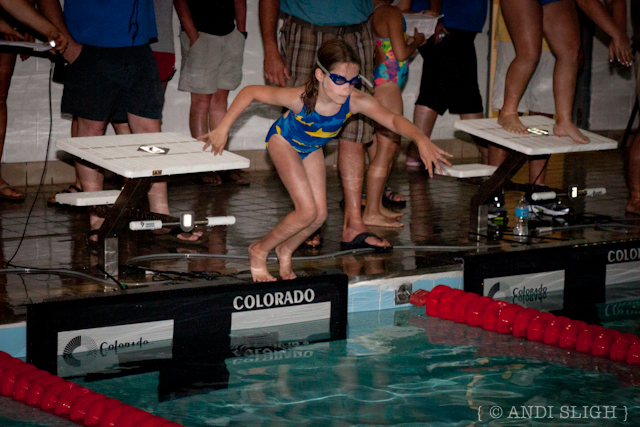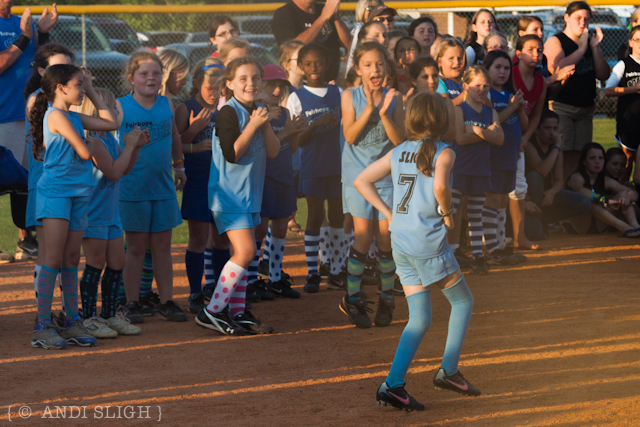In last Friday’s Snippets, I invited you to suggest future topics for the blog. Reader Ali had a request: that I share how I feel about the new federal regulations mandating that schools allow kids with disabilities to participate in sports. I should have known better than to open that door on what was a spur of the moment idea. 🙂 But since I invited the request, I’m committed to the post, and since I can’t default to another Mr. Andi Story, it might as well be today.
So here goes.
For those who don’t know, earlier this month the U.S. Department of Education’s Office for Civil Rights issued guidance to school districts across the country stating that children with disabilities have the right to participate in their school’s sports under Section 504 of the Rehabilitation Act (devotees will recall that Sarah Kate is covered by a 504 plan, not an IEP – 504 deals with accommodations, not educational plans). The DOE stated that these students should be provided with modifications, aids, and services as needed, although in cases where these accommodations would “fundamentally alter” the game or create an unfair advantage, schools should create separate, but equally supported opportunities (think wheelchair basketball).
Sounds great, right? Equal rights for all!
Hmmm….maybe not. It sounds great on the surface, but lots of things work in theory yet fall apart in the face of reality. I know lots of people will liken this decision to that of integration (and I’m not just talking racial integration – remember that integration of kids with disabilities was a separate fight that was won much later), but I don’t agree (not wholly, anyway). Others have compared it to Title IX – the mandate that gave women equal sports opportunities – but I find that comparison lacking, as well.
For starters, Title IX dealt with half of the population. While the sheer volume of potential players could have caused a massive overhaul to the sports programs in the country (and over time, did), there was also a large pool of potential supporters for female sports. The integration of people with disabilities (and racial minorities before them) aimed to eliminate discrimination – and by extension, access to education, a critical need for both the non-disabled and the disabled alike.
But students with disabilities can’t easily be equated with students who are female (or African-American).
For starters, disabilities vary widely both in type and severity. An attempt to level the playing field will never be successful because there are just too many variables and not enough individuals with any one subset of disability to accommodate as a group (i.e., there aren’t enough kids in wheelchairs at Sarah Kate’s school to start a wheelchair basketball league). The Paralympics has a complex system of levels and qualification requirements which would be difficult to reproduce on a local level on a widespread basis. Kids with disabilities are also a minority, unlike women, and once subdivided by type and severity of disability, the numbers for adding sports for them just won’t work in most places.
But setting aside “special sports teams,” what would be wrong with accommodations for conventional teams? Well, for starters, the cost to accommodate every student who wants to play could be exorbitant – especially if schools feel pressure, whether due to fear of a lawsuit or for other reasons, to preemptively prepare those accommodations. School budgets aren’t infinite, so what will be sacrificed to pay for them? As much as I’d like for my kids to participate with their peers in sports, they aren’t in school for the extracurriculars; they’re in school to be educated.
Education Secretary Arne Duncan, in issuing the guidance, stated, “Sports can provide invaluable lessons in discipline, selflessness, passion and courage, and this guidance will help schools ensure that students with disabilities have an equal opportunity to benefit from the life lessons they can learn on the playing field or on the court.”
Compelling, right? Sports has value for everyone!
Not so fast. While I can’t speak for all kids with disabilities, I know that Sarah Kate learned all of those things and more well before she started kindergarten – and without the benefit of organized sports. Years of physical therapy and having to fight for every milestone gave her a head start on her peers in learning those lessons.
Not everyone will like what I have to say – particularly within the disability community – but I don’t believe that every person is entitled to the exact same experience in school or in sports. Just like not everyone is equipped to graduate from college, not everyone has the ability to be on the varsity football team. We all have different gifts, and we all have different weaknesses. Discrimination is never acceptable, but not having the opportunity to participate in an activity that is competitive by its very nature (not to mention non-essential to education) doesn’t qualify as discrimination in my book.
Do I think that schools should attempt to accommodate kids with disabilities who want to play sports? Absolutely. Both the typical and non-typical kids benefit when all are included. Do I think it should be required by law? No.
Schools should be encouraged at every turn to do what they can to accommodate kids with disabilities, but they shouldn’t be forced to do it. Requiring it will breed resentment among administrators, parents, and the students themselves. Instead of encouraging partnerships between parents and schools, it forces us to be adversaries…again. If a policy intended to promote inclusion instead breeds division, it hasn’t achieved its aim now, has it?

If schools truly are rejecting kids from sports simply because they are disabled, then that’s wrong and they should be ashamed.
If the situation addressed by this new guidance is a big problem, I believe a change of heart is needed, and although it’ll be slow, it’ll be a healthier option for our kids. I would love to believe that our country is ready for this mandate, but a quick read of some of the comments in this article tell me we aren’t. Not yet. What if schools decide to drop a program altogether because they find that it’s not worth it to go to the extra effort (and expense) of accommodating everyone? In that case, everybody loses, and the kids with disabilities become the scapegoat for the failure.
But I wonder if the problem the DOE is attempting to fix with this new guidance even exists.
I’m sure that it does in some places (and I’m equally confident that it’ll continue in some places, even with this ruling), but anecdotal evidence suggests that students with disabilities who wish to participate in sports are already doing so. Almost every week, I link to one or more stories in the Sun-Beams of students who are wrestling, playing football, running track, etc. – and it’s not just the kids who are semi-competitive who are allowed to play, as evidenced by this story. It is my sense that the ones who are against including kids with disabilities are a handful of über-competitive parents, not the schools themselves.
And finally, I’ll admit a bit of a selfish motive in disliking the new mandate.
Although Nathan isn’t old enough to participate in sports yet, Sarah Kate is and has. She’s a three-year veteran of the swim team and she’s about to start her second year (third season) of softball. Excepting competitors who were disqualified, she has never beaten another swimmer in a meet. Despite being a consistent hitter, she has grounded out countless times on the softball field. That is her reality.
But she’s also the kid who was awarded Most Inspirational by the swim coaches. She’s the kid whose teammates rejoiced when she was chosen to receive the President’s Award at the end of her first softball season. She’s the one who was held up as the model for never giving up and never losing focus when the chips were down. She’s the kid who was declared “the bravest kid (he’d) ever seen” by a stranger who was a fan of the opposing team.
As much as softball and swim team torment me, they also are a source of great pride, because they allow Sarah Kate to demonstrate that she is special – and not in the negative way that kids with disabilities are often referred to as “special.” But she isn’t just special to me – she is special to all of the other people who see her and are inspired by her desire to try something that most people wouldn’t believe she was capable of doing.
Forcing the participation issue will change that dynamic, and not necessarily in a good way.
Now it’s your turn. What do you think of the new guidance? Let me have it in the comments.




Hi Andi:
One thing you wrote has stuck with me. “Sarah Kate is special to all of the other people who see her and are inspired by her desire to try something that most people wouldn’t believe she was capable of doing.”
It has me thinking… Will the unintended consequence of this new guidance be that kids are now forced to do sports – even if they don’t want to?? Would this guidance have the opposite effect on the kids (like me, like SK) in that they wind up HATING sport and not getting any of the benefits that it can bring to EVERYONE?
I am now disturbed. On face value I was pleased to see this issued, especially on the back of the Paralympics, after participating in national level parasport. You have challenged my thinking.
Thank you for that friend. Now, off to ruminate on your words some more!
That’s a very real possibility, Donna. Activities that would once have been considered extracurriculars are now part of the curriculum in many places. There’s no denying that art and music are beneficial, but for someone like me with NO talent for drawing, painting, etc., that would have been TORTURE. Music, on the other hand, would have been heaven!
I think there’s a tendency for those of us who live in Disability World to be impatient, because we want the changes that we seek to benefit us and ours. There’s no doubt that I want my kids to participate in sports without qualifiers. BUT…if we are truly committed to the ideal of “sports without qualifiers” we need to press for a societal change, not a legal remedy. Many women and minorities have been harmed by policies put forward to level the playing field in the workforce, because they reinforced the perception that those women and minorities weren’t worthy. The tide is turning in favor of people with disabilities; we shouldn’t risk jeopardizing it by forcing the issue on people who aren’t quite there yet. Look at all of the kids with disabilities who are now being elected homecoming kings/queens – those aren’t due to federal mandates, but it’s happening just the same.
When I read about this, something about it bothered me, but I couldn’t really put my finger on it and I felt a little guilty having an opinion, since I don’t have a child with a disability. But I think you really hit the mark with your insight.
Andi
I think you touched on so many things, but one that I cannot help but to focus on, is kids being forced to particpate in a sport. A child should participate baecause they choose to, not by force, it defeats the purpose. My children have been involved in sports from a young age, all by their choice, not because choices were made for them.
Love this
Thank you for writing this! When I first heard the news I had an immediate negative reaction. Not because I do not Boo to be able to participate in sports if she can compete at the same level, but I do not want the other kids to have to lower their level of competition to accommodate her. Allie doesn’t play team sports. Not because she is not fully able but because I cannot deal with team sports! But if she had an interest, I wouldn’t want Boo to affect Allie’s life in this area too. Allie already makes so many accommodations due to her sister’s needs. I would like her to have one aspect that is not.
On the other hand if the child can compete at the same level, then just because they are special should not disqualify th e m
I also thought it was way too broad & sweeping of an action. And your piece said my thoughts much better than I could. Some people were not meant to play sports in that setting – disability or not. Obviously , students shouldn’t be discouraged from trying & if they’re told from the get-go, no, you’re disabled, you can’t do this & we aren’t even going to think about accommodating you, then that’s wrong. But we can’t force schools by law, to make huge changes to their athletic programs that will have an unintended consequence to the entire student body.
Hi. Andi, this is really well said and persuasive. I also worry about the new law breeding resentment and issues (and actually doing the opposite of its inclusionary intentions). But at the same time, I worry about schools that don’t offer any sort of sports programs for children with special needs. I’d like to see schools take a diversity of approaches, based on their population. Hmmm. You’ve inspired me to write about this, will link back here.
I completely understand your worries – the truth is that there are no easy answers. I’m just as impatient as I’m sure you are to see changes. I’m not in favor of a 100% hands-off approach; I just think that for the long term the carrot would be better than the stick.
First, I am a mother of a 32 yo MMI daughter. She won her JH free throw contest; something she and I are still proud of. She is also a Special Olympic participant. She participated on her HS swimteam, but rarely competed (just like many other members of the swim-team.) The same HS also sponsored a SO track and field and swim team.
I am in favor of inclusion when it makes sense. And I think it’s ridiculous to expect a guide dog to accompany a blind basketball player on an otherwise seeing basketball team. (I did read about that fight recently in the paper.)
Yes, we all have a right to compete with our peers. Still, I did not play high school basketball, because I lacked the required skills. Same with many disabled students.
I think one of the problems of insisting on inclusion is some disabled students have a difficult time learning they really do have limitations. (I first heard about this problem from a mother of a diabetic, whose family and friends adapted their diet to fit her daughters. Not a good idea in the long run, she told me.)
Some SO adults still believe a pro-scout is going to discover them. That’s partly because they always see themselves as champions. This translates into non-athletic areas like work, driving, having a home of their own, and many other life-skills. My daughter took drivers ed, passed the written portion with reading assistance. Good for her. She soon realized driving was more than she wanted to take on. We focused instead on how to get where ever she wanted to go using public transportation.
My daughter is married to a MMI man. They live with us. Their desire is to have a four bedroom home with a yard. Whoa now, that’s way beyond their financial, mental or physical capabilities. A quick review of monthly payments brought them back to reality.
A long way to my point…. We all have limitations. Everyone must get in touch with what those limitations are. Even the disabled. We are doing the disabled no favors by adapting everything to them.
Well put, Adela. I would go even further, though, and say that it’s not just the kids with disabilities who have a difficult time grasping that they have limitations – I think it’s a common side effect of our “self-esteem!” parenting culture (as a friend of mine says, Special Snowflake Syndrome). It may be more pronounced among those with intellectual disability, however, because they may not completely understand why the limitations exist.
Mr. Andi was appointed by our governor to the Alabama Council for Developmental Disabilities, and one of the things that surprised him when he first started attending meetings was the insistence by many of the self-advocates that they should be included in typical sports. They were vehemently against both SO and parasport. They were adults without any intellectual disability – they had physical disabilities only. He was quite taken aback.